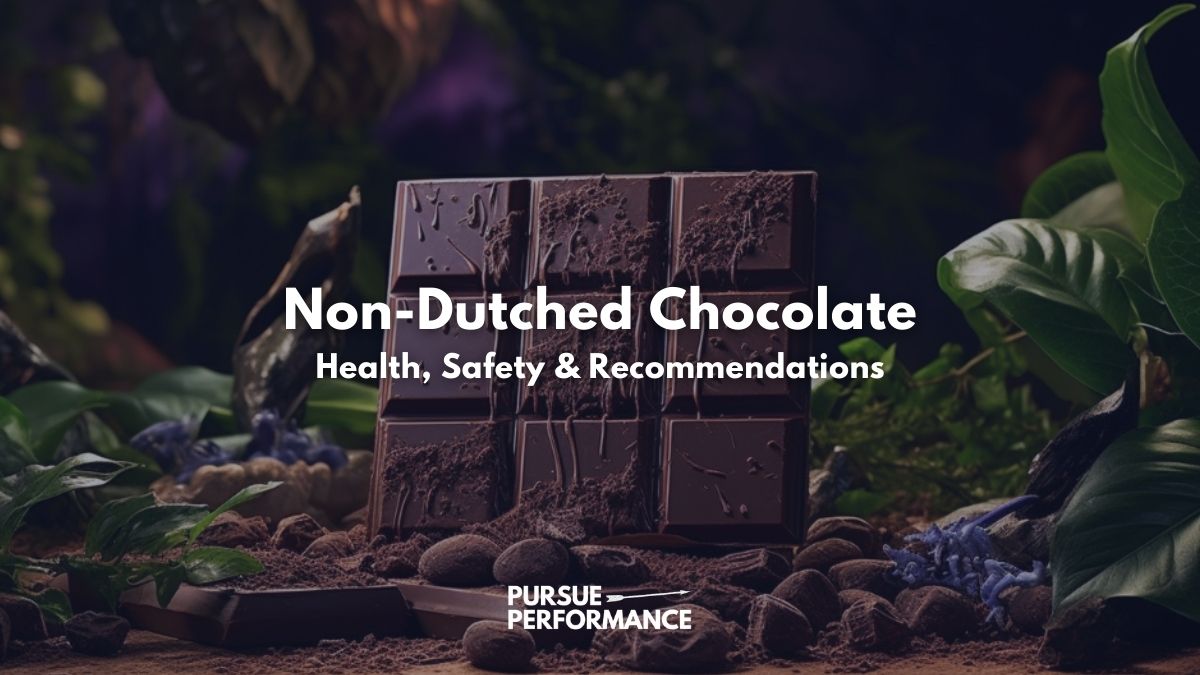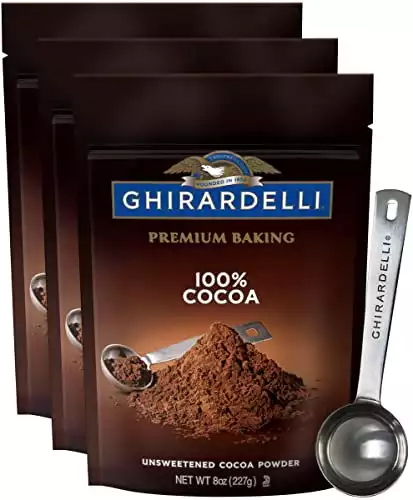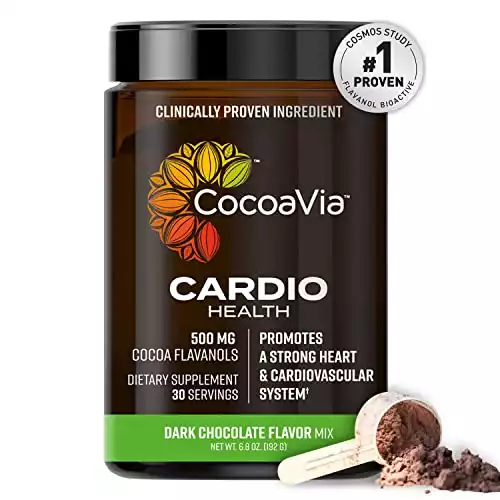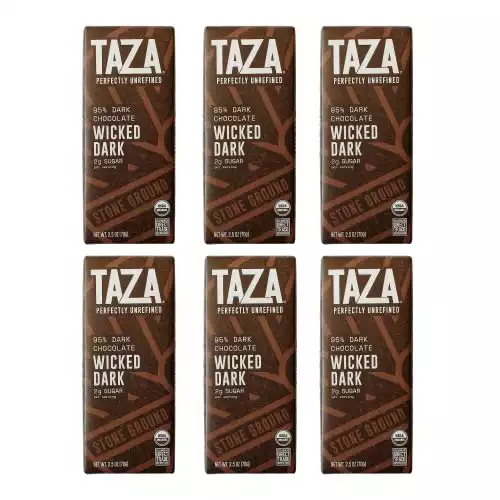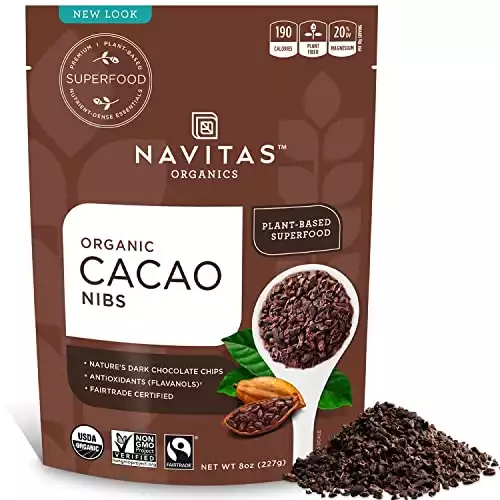Non-dutched chocolate, also known as natural or raw cacao, has become popular due to its associated health and potential longevity benefits.
However, recent concerns over heavy metal contamination in many mainstream chocolate brands have raised questions about how to choose safe, high-quality, non-dutched chocolate.
In this post, we will provide an overview of non-dutched chocolate and recommendations for choosing products with the best health profile.
Let’s bite into it!
Top Picks
Best Overall: CocoaVia Cardio Health Cocoa Powder
Best Chocolate Bar: Ghirardelli Intense Dark
Best on a Budget: Ghirardelli Unsweetened Cocoa Powder
Best Cacao Nibs: Navitas Organics
What is Non-Dutched Chocolate?
Non-dutched chocolate is chocolate that has not undergone the “Dutching” process.
Dutching treats the cacao beans with an alkalizing agent, neutralizing their natural acids and darkening the color.
However, this process also destroys many of the beneficial antioxidant flavonoids present in cacao.
Study: Alkalizing (dutching) dramatically decreases both the procyanidin content and antioxidant capacity in chocolate
Non-dutched chocolate has a lighter color and more bitter, acidic taste.
But it retains more polyphenols and flavanols that act as antioxidants and provide health benefits.
Related: Andrew Huberman Yerba Mate: Everything You Need to Know
Benefits of Non-Dutched Chocolate

Research shows non-dutched chocolate’s antioxidants support:
- Heart health by improving blood vessel function
- Lower blood pressure due to relaxation of arteries
- Increased blood flow to the brain, boosting cognition
- Anti-inflammatory effects that reduce cellular damage
Non-dutched chocolate also contains magnesium, which supports muscle and nerve function.
Theobromine provides a mild stimulant effect for improved mood and mental energy.
These compounds make non-dutched chocolate a potential recovery food for athletes.
Its antioxidants combat exercise-induced oxidative stress, while magnesium aids muscle function.
The carbohydrates in chocolate also help restore glycogen stores post-workout.
Related: Best Nootropics According To Reddit
Non-Dutched vs. Dutched Chocolate
Below, we put together a table outlining the key differences between these two types of chocolate.
| Type | Non-Dutched | Dutched |
| Process | No alkalizing agent used | Alkalized with potassium carbonate or sodium hydroxide |
| Taste | PH of 5.1-5.3, more bitter and acidic | PH increased to 6.8-7.2, smoother taste |
| Color | Lighter brown, L* value around 35 | Darker brown, L* value around 25 |
| Antioxidants & Flavonoids | Up to 1,000 mg flavonoids per 100g | 60-80% less flavonoids due to Dutching |
| Magnesium | 100-150 mg per 100g | 50-80 mg per 100g |
| Theobromine | 250-500 mg per 100g | 100-200 mg per 100g |
| Health Benefits | 8-10% improved blood flow, 5 mmHg lower blood pressure | Minimal health benefits observed |
| Heavy Metals | < 0.1 ppm lead, < 0.4 ppm cadmium | Varies by brand, some high levels found |
As you can see, non-dutched chocolate has higher levels of healthy compounds such as flavonoids, magnesium, and theobromine.
Heavy Metal Contamination Concerns
Recent testing by Consumer Reports found concerning levels of lead and cadmium in many popular dark chocolate brands, including:
- Lindt
- Dove
- Beyond Good
- Hershey’s
- Lily’s
- Godiva
- Chocolove
This heavy metal contamination likely comes from the soil where cocoa plants are grown.
High lead exposure can harm kidney function, increase blood pressure, and impair fertility.
Cadmium also raises the risk of lung and kidney damage and brittle bones.
Choosing organic and ethically sourced chocolate can help avoid excessive heavy metals.
Fortunately, there is un-dutched dark chocolate tested for heavy metals.
Related: Seed Oils to Avoid: Complete Guide
Low Cadmium Cacao Powder
According to Consumer Lab, Ghirardelli’s cocoa powder was on of the only tested options without too much cadmium.
Another option that is rated favorable is CocoVia. It is also regarded as a high-flavanol cocoa powder brand.
Testing indicates it has lower cadmium levels compared to many other cocoa products on the market.
Biohacker and longevity experimenter Bryan Johnson includes chocolate in his sophisticated anti-aging routine.
ConsumerLab’s analysis of Mars Symbioscience products found cadmium levels to be less than 0.3 mcg per serving in Cardio Powder.
Tips for Choosing the Healthiest Non-Dutched Chocolate

When selecting non-dutched chocolate, keep the following tips in mind:
- Look for 100% cacao content – This indicates no added sugar or cocoa butter, maximizing antioxidant levels. Aim for at least 70% cacao.
- Check the ingredients – Make sure chocolate contains only cocoa beans and cocoa powder, not cocoa processed with alkali.
- Buy organic & ethically sourced – Third-party certifications like Fair Trade ensure safe farming practices that minimize heavy metals.
- Consider independent testing – If concerned, look for brands that provide independent lab testing for heavy metals.
- Store properly – Keep chocolate tightly sealed in a cool, dry place to preserve freshness and antioxidants.
Related: How to Beat Brain Fog From Carbohydrates
Recommended Non-Dutched Chocolate Brands
Here are some high-quality non-dutched chocolate brands to consider.
This list is comprised of several options for dark chocolate without lead and cadmium.
When shopping for non-dutched chocolate, examine the ingredients and sourcing.
Seek out organic, Fair Trade products made with minimal processing for the best nutritional profile and safety.
Moderating your daily chocolate intake to 1-2 ounces can allow you to reap the benefits of its unique antioxidants and minerals.
Related: Bryan Johnson Caffeine: Tea, Coffee, and Recommendation
FAQ
What is non-dutched chocolate?
Non-dutched chocolate has not undergone the Dutching process to neutralize acids. This retains more antioxidants like flavonoids.
What are the health benefits of non-dutched chocolate?
It contains antioxidants that provide heart, brain, and anti-inflammatory benefits. Magnesium supports muscle function. Theobromine improves mood.
Is non-dutched chocolate good for workouts and recovery?
Yes, the antioxidants combat oxidative stress from exercise. Magnesium aids muscle function. Carbs help restore glycogen post-workout.
How do you identify high quality non-dutched chocolate?
Look for at least 70% cacao content. Check for minimal ingredients without “alkali-processed” cocoa. Choose organic and fair trade sourced chocolate.
How should you store and use non-dutched chocolate?
Store in a cool, dry place and consume within a few months. Enjoy 1-2 ounces daily. Use cocoa powder in smoothies.
How can you tell if chocolate is Dutched?
Read the ingredients – it will say something like “cocoa processed with alkali.” Dutched chocolate is also darker in color.
What brand of cocoa is not Dutch processed?
Some common brands of non-dutched cocoa are Navitas Organics, Viva Naturals, and Nature’s Charm.
Which is healthier Dutch processed cocoa or regular cocoa?
Regular, non-dutched cocoa retains more antioxidants and flavanols so it has greater health benefits.
What is the difference between Dutch chocolate and regular chocolate?
Dutch chocolate has a smoother, less bitter taste. Regular is more acidic tasting but higher in antioxidants.
Why does Dutch chocolate taste different?
The Dutching process neutralizes acids, removing bitterness but also beneficial compounds like flavonoids.

